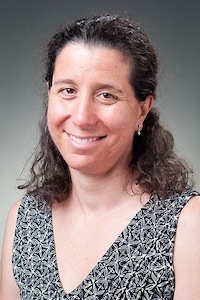New office supports the academic advisors who support students
Nikki Bollig (right), an academic advisor at the Wisconsin School of Business, meets with undergraduate Mark Kaczynski for an advising session in her office at Grainger Hall.
Photo: Bryce Richter
Five years ago, 20 University of Wisconsin–Madison undergraduates majored in statistics. Today, that number has risen to 110 – and it keeps going up.
Thanks to funding from the Madison Initiative for Undergraduates (MIU), the Department of Statistics hired faculty associate Kevin Packard as its first staff advisor. Despite years as a lecturer, Packard is still learning to interpret the maze of UW–Madison’s academic policies and procedures.
He’s not alone.
“Every school and college has separate breadth and admissions requirements,” says Jeff Hamm, associate dean for student services in the School of Education. “How do you explain these things to students when we have this crazy-quilt patchwork of practices?”

Singer
In its first year of existence, the Office of Undergraduate Advising (OUA) aims to help ease this burden by improving advising from within: advising the advisors. The effect on students will be subtle but profound.
“Quality advising is a key to helping students put together the pieces of their Wisconsin Experience,” says Wren Singer, director of undergraduate advising. “When advisors are effectively trained, mentored and supported, the effects will quickly impact the student experience.”
Approximately 1,000 people spend at least part of their time advising UW–Madison students, including faculty and academic staff in every school and college and many departments and programs. Besides the vast differences between school and college curricula, advisors and students often share similar concerns: communication difficulties between offices, too much time spent figuring out advising tools, not enough time for appointments.
Various entities, such as the Council on Academic Advising, have attempted to bring advisors together over the years, with mixed results. With some exceptions, larger efforts to improve advising languished in the idea phase.
“In the past, when advisors had great ideas about improving the student experience, they had to carve out time from their advising schedules to devote time to projects,” says Hamm. “Now we have folks who can take on the development and administration of projects and coordinate things at the campus level. That’s a tremendous gift.”
The central office will develop and coordinate advisor training, streamline advising technology, conduct advising assessment, and facilitate communication among advisors. The office will also coordinate discussion on advising policy issues and recommend effective strategies for improving the overall student experience.
In addition, the office oversees four direct service advising offices: the Cross-College Advising Service, the Center for Pre-Health Advising, the Center for Pre-Law Advising and the Undergraduate Academic Awards Office.
“When advisors are effectively trained, mentored and supported, the effects will quickly impact the student experience.”
Wren Singer
“All advisors are interested in more, better ways to communicate,” says Gery Essenmacher, associate dean in Letters & Science Student Academic Affairs and leader of advising in L&S. “They’ve really created a place to focus for some of these new initiatives. If I’m an advisor, especially a new advisor, who can I talk to about technology? Or if I’m just one person in the chemistry department, and I have an idea that comes from a conference … now there’s a place to go.”
The effort to improve advising reflects the core goals of the Madison Initiative for Undergraduates: increasing the value, quality and affordability of an undergraduate education. In April 2010, the MIU Oversight Committee allocated $1.5 million for improvements in academic and career advising.
In addition to helping integrate new advisors into the existing community, the centralized OUA dedicated four FTE positions to lead and coordinate advising campus-wide and oversee the four direct reporting units.
Singer joined the office from the Center for the First-Year Experience (CFYE), where she spent significant energy improving the advising experience at Student Orientation, Advising and Registration (SOAR). In both leadership positions, she has helped create a tangible presence for new campus entities intended to provide central coordination for decentralized functions.
“We have a variety of advising-related governance committees,” says Essenmacher. “Wren, in particular, has really brought some clarity to the roles of each committee, and how they refer action to other committees. That’s happened fairly quickly.”
Annette McDaniel, heading OUA’s training and communication efforts, worked alongside Singer as assistant director of CFYE and coordinator of the Transfer Transition Program. Jeff Shokler, previously with the L&S Honors Program, directs the office’s efforts in technology and assessment. A fourth staffer, Kory Deavers, coordinates budget and human resources for the central office and reporting units.
In its first year, OUA is focusing on addressing a list of operational priorities, otherwise known as “low-hanging fruit.” The most immediate needs include identifying and reaching out to all campus advisors, creating basic models for training and welcoming new advisors, developing a central electronic resource for advising information and — perhaps most important — reintroducing the Council on Academic Advising’s ten “Guiding Principles for Academic Advising” as a core vision for undergraduate advising at UW–Madison.
Over in the Department of Statistics, Kevin Packard has already perceived an uptick in support.
“My whole experience with advising coincided with [the opening of OUA], so it’s coordinated rather well,” says Packard. “Training has an effect: it brings up things that I need to know. I don’t have to wait to learn something.”
With such a massive campus, Packard knows that OUA can’t solve all of his advising issues, curricular or otherwise. But he’s glad for their assistance nonetheless.
“The more that the university can be seen as some sort of cohesive thing, the better the experience students will have,” Packard says. “I think this office has helped us move toward that.”




